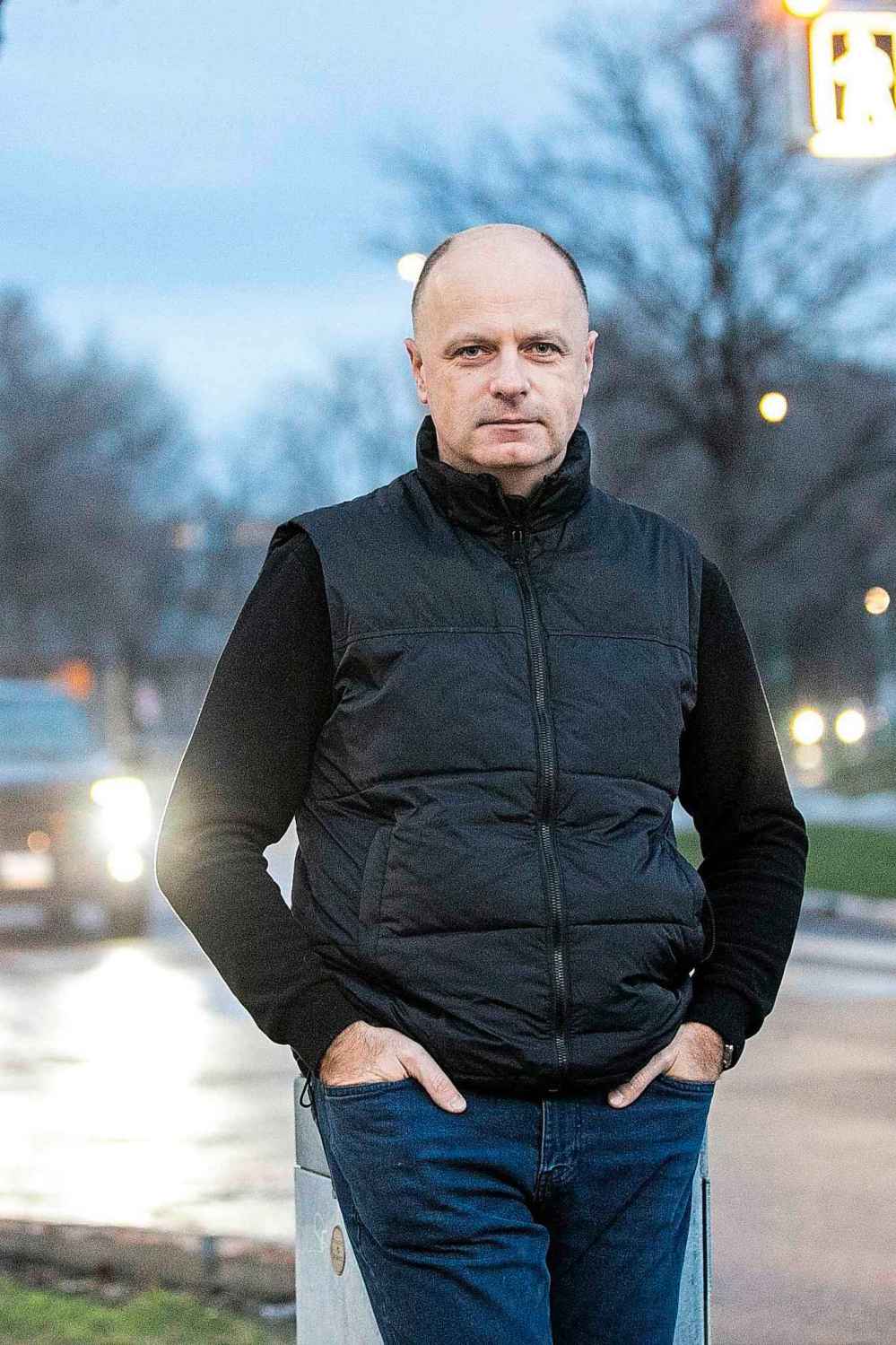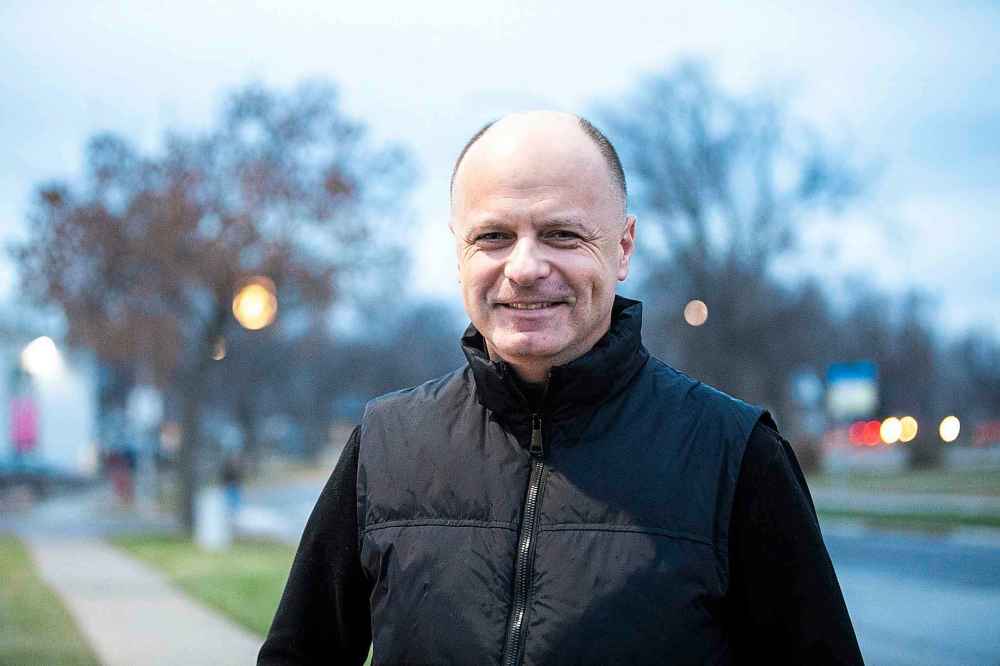From the judge’s chambers to the beer vendor Ukrainian man sacrifices career to be reunited with family in Winnipeg
Read this article for free:
or
Already have an account? Log in here »
To continue reading, please subscribe:
Monthly Digital Subscription
$0 for the first 4 weeks*
- Enjoy unlimited reading on winnipegfreepress.com
- Read the E-Edition, our digital replica newspaper
- Access News Break, our award-winning app
- Play interactive puzzles
*No charge for 4 weeks then price increases to the regular rate of $19.00 plus GST every four weeks. Offer available to new and qualified returning subscribers only. Cancel any time.
Monthly Digital Subscription
$4.75/week*
- Enjoy unlimited reading on winnipegfreepress.com
- Read the E-Edition, our digital replica newspaper
- Access News Break, our award-winning app
- Play interactive puzzles
*Billed as $19 plus GST every four weeks. Cancel any time.
To continue reading, please subscribe:
Add Free Press access to your Brandon Sun subscription for only an additional
$1 for the first 4 weeks*
*Your next subscription payment will increase by $1.00 and you will be charged $16.99 plus GST for four weeks. After four weeks, your payment will increase to $23.99 plus GST every four weeks.
Read unlimited articles for free today:
or
Already have an account? Log in here »
Viktor Bratasyuk was walking the halls of the U.S. Supreme Court as part of an international judicial fellowship last fall. Today, the longtime Ukrainian judge is working part time at a beer vendor in St. Vital.
While that may be viewed as a dramatic setback, the 47-year-old father of two — who became a judge in 2009 after working as a lawyer, lecturer and deputy dean of the faculty of law at Ternopil National Economics University — sees it differently.

“I’ve been reunited with my family,” he told the Free Press. “I could be considered a traitor, but there is peace here. I am happy.
“I left to be with my family. I like to be here. I like to be with my family. It really hurts me what’s going on in my country.”
Bratasyuk’s wife and two sons, now 20 and 18, arrived in Winnipeg in 2023. He stayed behind, partly because Ukrainian rules barred him from leaving except on business, and partly because he had been assigned to help defend the northern border of Ternopil Oblast in western Ukraine, where his family is from.
“It was very difficult to not even have the possibility to hug your kids, hug your wife for years,” he said.
He told about drones striking near his home and showed pictures of his office, which had its windows blown out by a drone strike in July.
Eventually, he reached a breaking point.
While on a business trip to Poland in March 2024, he took the opportunity to travel to Canada to visit his family. When he was selected for the judicial fellowship program in Washington, D.C., he stayed in Winnipeg another week before returning to Ukraine.
In August, he was reunited with his family. Retiring from his judgeship gave him legal freedom to leave Ukraine.
“I could be considered a traitor, but there is peace here. I am happy.”
Starting over is a familiar challenge for many newcomers whose professional credentials aren’t transferable in Canada, said Kathy Landygo, an executive assistant with the Ukrainian Canadian Congress — Manitoba Provincial Council, who helps Ukrainian immigrants find work.
“The vast majority of their credentials aren’t recognized here or they have to go through a rigorous process,” she said.
“In terms of lawyers and judges, our legal system is much different. We don’t see it as much here (in Winnipeg), but if you go to Toronto, for instance, you’re going to find an Uber driver who is a doctor or a lawyer or an engineer. It’s sad.”
Landygo noted that her husband, who came from Iran in 2006 with a master’s degree in electronic engineering, had to take additional courses to meet Canadian requirements.
“Those highly educated people who know no English know the chances of working in their field of study will be very difficult,” she said. “People, at first, didn’t understand why. It’s very disappointing for them.”
Some local firms have hired Ukrainian lawyers as legal assistants, she said, and companies such as MacDon Industries Ltd. have hired welders.
Working at a beer vendor is a dramatic shift from his former career, but Bratasyuk approaches it with perspective.
“I realize that I was a judge in Ukraine, but here I am a guest, and I need to start from the very beginning,” he said. “It’s pretty different than what I was doing previously, but I’m doing my best.”
“It’s pretty different than what I was doing previously, but I’m doing my best.”
He said living without his family for years was difficult.
“At one point, I had a pretty cool job. I liked it. I did it in the best way. I consider myself a cool judge. It was a difficult decision.”
Bratasyuk is not pursuing a legal career in Manitoba and isn’t sure what he will do long term.
His new job, he said, has had unexpected rewards, especially the simple act of connecting with customers.
“They are surprised I was a judge and now I work in this beer store, they want to know my story,” he said.
“So this work has relaxed me compared to my former job. It’s a hard job, it’s not a high-paying job. I get pleasure from communicating with people. It makes me happy.”

Bratasyuk said his family is grateful for the Canada-Ukraine Authorization for Emergency Travel — a program that helped them obtain visas and, crucially for his two sons studying at the University of Manitoba, allowed them to apply as regular students rather than international students, which would mean significantly higher tuition.
The family has settled into life in Winnipeg after receiving support from local churches.
Friends in the Ukrainian community helped his wife find a job and provided furniture for their rental home in East Kildonan. His sons are working while studying. The family has applied to become permanent residents.
For now, Bratasyuk continues adjusting to his new life. Planes flying overhead sometimes jolt him awake, reminders of the drones that once hovered above his neighbourhood. At Nuit Blanche this year, drones that were recording footage overhead unsettled him.
“You could hear that buzzing,” he said. “I understand that it’s a safe country. There wouldn’t be drone strikes here. But I can’t get it out of my head right now.
“I was used to living a quiet life. Now, that’s unusual for me after all of the drones, all of the alarms, all of the drones being shot down. I’m trying to stabilize.”
scott.billeck@freepress.mb.ca

Scott Billeck is a general assignment reporter for the Free Press. A Creative Communications graduate from Red River College, Scott has more than a decade’s worth of experience covering hockey, football and global pandemics. He joined the Free Press in 2024. Read more about Scott.
Every piece of reporting Scott produces is reviewed by an editing team before it is posted online or published in print — part of the Free Press‘s tradition, since 1872, of producing reliable independent journalism. Read more about Free Press’s history and mandate, and learn how our newsroom operates.
Our newsroom depends on a growing audience of readers to power our journalism. If you are not a paid reader, please consider becoming a subscriber.
Our newsroom depends on its audience of readers to power our journalism. Thank you for your support.
History
Updated on Thursday, November 20, 2025 11:44 AM CST: Updates formatting.




